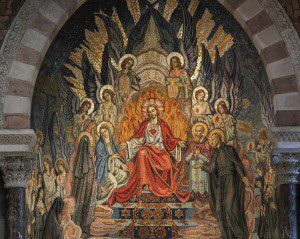
1 John 4 is one of the most comforting and life-giving chapters of the whole Bible. People sometimes call it the love chapter because of its emphatic declaration in verse 8 that “whoever does not love does not know God, for God is love.” In my daily scripture reading this morning, I encountered a verse that had not jumped out at me before in my dozens of times reading this chapter: 1 John 4:17, which says, “Love has been perfected among us in this: that we may have boldness on the day of judgment, because as he is, so are we in this world.”
How can love and the day of judgment go together at all? Over the last century and a half of American Christianity shaped by the camp meeting revivalism of the Second Great Awakening, the specter of a harsh judgment day has served as a bludgeon in Christian evangelism to scare people into getting saved. The only thing to know about judgment day is that God views everyone as a horribly wicked sinner and will confer nihilistically identical verdicts of eternal damnation on each person regardless of how bad or good they actually were unless they’ve “accepted Jesus” as their personal Lord and savior, whatever that actually means.
So what would it mean to have “boldness” on the day of judgment? The members of ISIS would certainly claim to be expressing boldness in rendering Allah’s judgment against the infidels, the latest victims being a group of Ethiopian Christian migrants who were trying to get to Europe by way of Libya. If God is nihilistically cruel and perfectionist, then we have to confess that ISIS is expressing solidarity with his wrath against humanity even if they are ultimately destined for eternal hellfire too, just like the Roman soldiers who crucified Jesus to give God a tortured body on which to spew his wrath. Hopefully that’s a hideous enough thought that it’s clear we can find a better way to understand God’s judgment.
What if our boldness on judgment day has the nature of “perfected love”? How could “perfected love” ever express its boldness in a vicious orgy of violence? There are certainly some Christians who have tried to contort their definition of divine love to make room for a terrorist God. But John would object. He writes in 1 John 4:12, “No one has ever seen God; if we love one another, God lives in us, and his love is perfected in us.” Whatever counterpoints might be offered by Moses and all the Old Testament prophets who talked of seeing God face to face, John’s claim is part of the Bible too, and he says that the only way to “see” God is through loving one another.
So what does a judgment day look like for those whose boldness comes from perfected love? It is the day when those who really did love are vindicated for all the abuses, misrepresentations, and betrayals they have received as a response to their love. Somehow, what 1 John 4:17 tells us is that love will win. The people with all the money and power will not. The terrorists will not. The backstabbers and fair-weather friends and our completely unfair life circumstances will not.
I imagine there will be some and perhaps there will be many who will fail God’s judgment, whatever that looks like, but I trust that the one judging is perfectly loving and truthful, not the nihilistically cruel perfectionist that the 19th century revivalists invented to make their tent meetings a terrifying, rousing success.
Judgment day will be the moment when the God who is love says, “I saw how you loved and how you were repaid with hate or indifference, and I want you to know that I’m not okay with that.” Of course his perfectly loving face will also exude the painful truth of the times when we despised the love of others. But the good news about the final judgment day is that it won’t be like the many other judgment days that we face throughout life. We will be judged by a loving creator on the basis of the love that we have lived out. Somehow that feels less like the ruthless judge with the European accent on Dancing with the Stars and more like a Mr. Rogers-looking therapist who is both perfectly truthful and perfectly loving. God sees not only all of our mistakes, but all of their mitigating circumstances. Our love will be vindicated while our hate and self-righteousness will be humbled.
It’s not like there’s only one day of judgment at the end of time. In our world, judgment day happens every day. We are constantly being evaluated and found unworthy. Right now, many high school seniors are dealing with the disappointment of rejection from the college they wanted to attend. Likewise, many college seniors are having to change their plans after receiving a three sentence form letter from the graduate program that had been the next step in their life dream. Workers are being laid off. Shark tanks of investors are ripping apart the pitches of ridiculously hard-working entrepreneurs who need their money. Long-time boyfriends and girlfriends are getting dumped just because it supposedly isn’t clicking right anymore.
For pastors like me, judgment day happens every week in the ten minutes before our worship service is supposed to start. As we wait by the door, the number of cars that fill up our parking lot is the weekly judgment of our effectiveness. Did we write our weekly email concisely enough? Did our sermon promotional video get enough facebook shares? Have we been persistent enough in our communication with absentees without being too aggressive? Did we smile naturally enough at the visitors last week and ask enough personal questions but not too many? Do we have enough of that intangible thing that people call charm? Does our face shine in the right way without glowing in a way that’s distracting or off-putting?
When God is the judge, he doesn’t ask any of these questions. He asks one question: did you love? Now before the orthodoxy police fire off their angry comments, let me clarify that I agree that everything about Christian doctrine is important and teaching false doctrine is dangerous. And I also believe what John writes in 1 John 4:16: “God is love, and those who abide in love abide in God, and God abides in them.”
Orthodoxy is important for a very specific reason. It determines the depth to which we can plunge into God’s love. Our heresies are like large dead bugs floating in the otherwise pure milk of God’s love. We can still drink it, somewhat. Some people apparently slurp it down, bugs and all. What we believe is critically important to making us more perfect vessels of God’s love in the world. But heretics can accidentally gain the heart of Christ, just like ruthlessly correct dogmatists can utterly lack it (see 1 Corinthians 13).
In any case, let us remember that showing love in simple ways to the people around us is what matters to God way more than all our achievements and all the weekly tasks that we can type into many-paged reports that prove our due diligence. What matters is whether I kiss my wife before I leave for work. What matters is whether I squat down and listen closely whenever my son is mumbling something I can’t understand about his day. What matters is whether I stop for people and smile for people. Whatever else succeeds and fails in our careers and family lives, the only judge who matters knows our hearts, and he sees it every time we love.
















